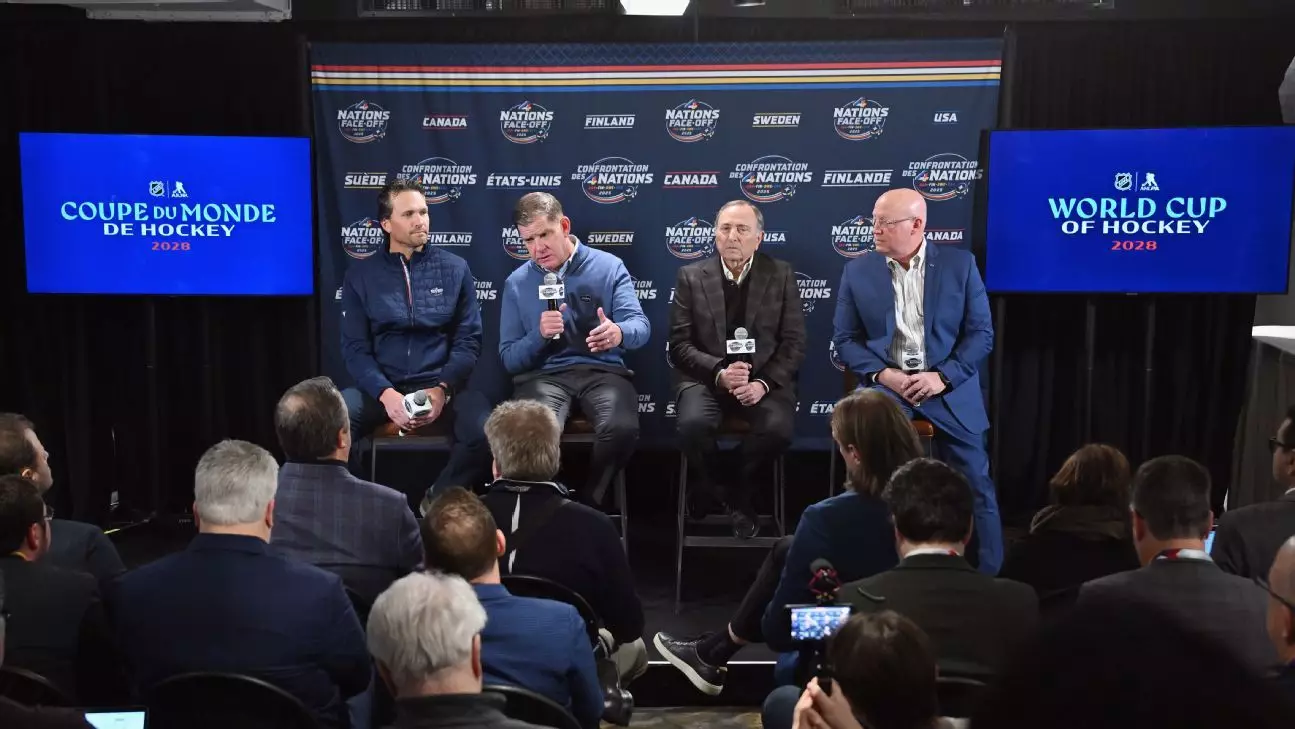The concept of international hockey competition has witnessed a revival with the announcement that the World Cup of Hockey will make its comeback in February 2028. This declaration, made by NHL Commissioner Gary Bettman during a press conference alongside NHL Players‘ Association (NHLPA) Executive Director Marty Walsh, signals a renewed commitment to establishing a thrilling calendar of international hockey events that fans have been yearning for. The announcement not only sheds light on upcoming tournaments but also on the broader implications for player participation and team structures.
Fans and players alike have expressed a strong desire to see NHL players participate in global competitions, a longing that has persisted since their absence from the Olympic Games post-2014. The upcoming 2026 Winter Olympics in Milan will provide a significant opportunity to reintegrate NHL stars back into the international scene. Bettman highlighted the importance of best-on-best competition, describing the recent 4 Nations Face-Off featuring the United States, Canada, Finland, and Sweden as a precursor to more extensive events. This momentum fosters a genuine excitement among players like Connor McDavid and Auston Matthews, who are eager to represent their countries at the peak of their careers.
“For quite some time, we’ve been out of the international spotlight,” expressed Bettman, emphasizing the significance of a consistent schedule of Olympics and World Cups. The cycle of competition every two years is not merely beneficial for the teams involved; it could invigorate the sport’s global appeal, enthralling fans with high-stakes games filled with star power and national pride.
As the plans for the World Cup of Hockey progress, Bettman revealed intentions to begin accepting bids from potential host cities. Interestingly, European cities are now encouraged to pitch their candidacy, signaling the NHL’s desire to expand the event’s reach beyond North America. The anticipated format will witness at least eight teams participate, and in a significant change from the previous iteration, participants will exclusively comprise players representing their respective countries. This move towards national teams not only promotes the authenticity of international competition but also enhances fan engagement by showcasing players under their national flags.
The implications of such a change could impact the loyalty and investment of fans, as seeing homegrown talent contend on an international stage often generates a sense of camaraderie and national pride. Bettman also confirmed that the International Ice Hockey Federation (IIHF) will not govern this tournament, ensuring that it remains an NHL-centric event unencumbered by external regulations.
One of the biggest questions lingering over the return of the World Cup is the status of Russian hockey players currently banned from international competition due to geopolitical tensions. Since the onset of the Ukraine conflict in 2022, Russia’s exclusion from international play has stirred substantial discourse amongst players and officials. Walsh pointed out the desires of Russian players to participate, emphasizing their remarkable skills. However, the path to their inclusion remains complex and contingent upon changing political landscapes.
NHL Deputy Commissioner Bill Daly indicated that the NHL tends to align its policies with broader international governance, asserting that a significant shift in the current political situation would be necessary for Russian athletes to re-enter the fray. This ambiguity highlights the intersection of sports and politics, raising questions about players who could have made a substantial impact in these tournaments but remain sidelined due to circumstances beyond their control.
Beyond the excitement surrounding international play, the announcement bears the hallmark of an improving relationship between the NHL and the NHLPA. As both parties gear up for impending negotiations on a new collective bargaining agreement (CBA) set to expire in September 2026, Bettman expressed optimism regarding prospects for collaboration on future initiatives. This newfound synergy may facilitate not only smoother negotiations but also a proactive approach towards arranging international competitions going forward.
The excitement surrounding the World Cup of Hockey heralds a promising era for the sport. As fans and players anticipate the resumption of international competition featuring the best players, the NHL faces the challenge of navigating political landscapes, ensuring fair representation, and capitalizing on this renewed interest. If orchestrated successfully, the World Cup could become a celebrated event on the sporting calendar, showcasing the brilliance of hockey at its best while unifying countries through the universal language of the game.


Napsat komentář